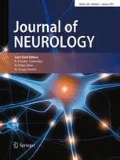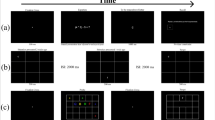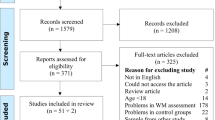Abstract
Little is known about the pattern of subacute cognitive domain impairments after ischaemic stroke, nor the temporal evolution of such impairments. Our objective was to investigate the pattern of cognitive impairment in different neuropsychological domains up to a year after ischaemic stroke. We included prospectively collected data from an observational database of stroke patients at the National Hospital for Neurology and Neurosurgery, Queen Square, London, UK. Patients were categorised into temporal groups according to the time between the index stroke and neuropsychological profiling. The prevalence of impairment in different cognitive domains was then compared between these categories. The final cohort consisted of 209 patients. Frontal executive function, perceptual and nominal skills all showed a strong trend, with levels of impairment of approximately 30 % at <1 month and less than half this at >3 months (p < 0.05). Speed and attention was the most impaired domain, but had the greatest trend for decreasing impairment, from 72.4 % acutely to 37.9 % after 3 months (p < 0.01). By contrast, we found that impairment in visual and verbal memory showed no statistically significant change over time. Our results suggest a domain-specific improvement in cognition after ischaemic stroke. Early assessments may overestimate longer term cognitive deficits, particularly in speed and attention and perceptual functions. The domain-specific improvement patterns may help to inform long-term rehabilitation plans, which should not be based solely on cognitive assessments undertaken within the first month after stroke.

Similar content being viewed by others
References
Fratiglioni L, Launer LJ, Andersen K, Breteler MM, Copeland JR, Dartigues JF, Lobo A, Martinez-Lage J, Soininen H, Hofman A. Incidence of dementia and major subtypes in Europe: a collaborative study of population-based cohorts. Neurologic Diseases in the Elderly Research Group. Neurology 2000;54(11 Suppl 5):S10–S15
Rocca W, Hofman A, Brayne C, Breteler M, Clarke M, Copeland JR, Dartigues JF, Engedal K, Hagnell O, Heeren TJ et al (1991) The prevalence of vascular dementia in Europe: facts and fragments from 1980–1990 studies. EURODEM-Prevalence Research Group. Ann Neurol 30(6):817–824
Gorelick PB, Scuteri A, Black SE, Decarli C, Greenberg SM, Iadecola C, Launer LJ, Laurent S, Lopez OL, Nyenhuis D, Petersen RC, Schneider JA, Tzourio C, Arnett DK, Bennett DA, Chui HC, Higashida RT, Lindquist R, Nilsson PM, Roman GC, Sellke FW, Seshadri S (2011) Vascular contributions to cognitive impairment and dementia: a statement for healthcare professionals from the American heart association/American stroke association. Stroke 42(9):2672–2713
Pendlebury ST, Rothwell PM (2009) Prevalence, incidence, and factors associated with pre-stroke and post-stroke dementia: a systematic review and meta-analysis. Lancet Neurol 8(11):1006–1018
Pohjasvaara T, Erkinjuntti T, Vataja R, Kaste M (1997) Dementia three months after stroke. Baseline frequency and effect of different definitions of dementia in the Helsinki Stroke Aging Memory Study (SAM) cohort. Stroke 28(4):785–792
Wentzel C, Rockwood K, MacKnight C, Hachinski V, Hogan DB, Feldman H, Ostbye T, Wolfson C, Gauthier S, Verreault R, McDowell I (2001) Progression of impairment in patients with vascular cognitive impairment without dementia. Neurology 57(4):714–716
Bour A, Rasquin S, Boreas A, Limburg M, Verhey F (2010) How predictive is the MMSE for cognitive performance after stroke? J Neurol 257(4):630–637
Nys GM, van Zandvoort MJ, de Kort PL, Jansen BP, Kappelle LJ, de Haan EH (2005) Restrictions of the Mini-Mental State Examination in acute stroke. Arch Clin Neuropsychol 20(5):623–629
Jaillard A, Naegele B, Trabucco-Miguel S, LeBas JF, Hommel M (2009) Hidden dysfunctioning in subacute stroke. Stroke 40(7):2473–2479
Nys GM, Van Zandvoort MJ, De Kort PL, Jansen BP, Van der Worp HB, Kappelle LJ, De Haan EH (2005) Domain-specific cognitive recovery after first-ever stroke: a follow-up study of 111 cases. J Int Neuropsychol Soc 11(7):795–806
Lesniak M, Bak T, Czepiel W, Seniow J, Czlonkowska A (2008) Frequency and prognostic value of cognitive disorders in stroke patients. Dement Geriatr Cogn Disord 26(4):356–363
O’Brien JT, Erkinjuntti T, Reisberg B, Roman G, Sawada T, Pantoni L, Bowler JV, Ballard C, DeCarli C, Gorelick PB, Rockwood K, Burns A, Gauthier S, DeKosky ST (2003) Vascular cognitive impairment. Lancet Neurol 2(2):89–98
Adams HP Jr, Bendixen BH, Kappelle L, Biller J, Love BB, Gordon DL, Marsh EE 3rd (1993) Classification of subtype of acute ischaemic stroke. Definitions for use in a multicenter clinical trial. TOAST. Trial of Org 10172 in Acute Stroke Treatment. Stroke 24(1):35–41
Werring DJ, Frazer DW, Coward LJ, Losseff NA, Watt H, Cipolotti L, Brown MM, Jager HR (2004) Cognitive dysfunction in patients with cerebral microbleeds on T2*-weighted gradient-echo MRI. Brain 127(10):2265–2275
Cassidy T, Lewis S, Gray C (1998) Recovery from visuospatial neglect in stroke patients. J Neurol Neurosurg Psychiatr 64:555–557
Nys GM, van Zandvoort MJ, de Kort PL, van der Worp HB, Jansen BP, Algra A, de Haan EH, Kappelle LJ (2005) The prognostic value of domain-specific cognitive abilities in acute first-ever stroke. Neurology 64(5):821–827
Wagle J, Farner L, Flekkoy K, Bruun Wyller T, Sandvik L, Fure B, Stensrod B, Engedal K (2011) Early post-stroke cognition in stroke rehabilitation patients predicts functional outcome at 13 months. Dement Geriatr Cogn Disord 31(5):379–387
Hachinski V, Iadecola C, Petersen RC, Breteler MM, Nyenhuis DL, Black SE, Powers WJ, DeCarli C, Merino JG, Kalaria RN, Vinters HV, Holtzman DM, Rosenberg GA, Wallin A, Dichgans M, Marler JR, Leblanc GG (2006) National Institute of Neurological Disorders and Stroke-Canadian Stroke Network vascular cognitive impairment harmonization standards. Stroke 37(9):2220–2241
Acknowledgments
A.C. receives research support from the Greek State Scholarship Foundation; D.J.W. receives research support from the Department of Health/Higher Education Funding Council for England (Clinical Senior Lectureship Award) and the Stroke Association. This work was undertaken at UCLH/UCL, which received a proportion of funding from the Department of Health’s National Institute for Health Research Biomedical Research Centre’s funding scheme.
Conflicts of interest
None.
Author information
Authors and Affiliations
Corresponding author
Electronic supplementary material
Below is the link to the electronic supplementary material.
Rights and permissions
About this article
Cite this article
Hurford, R., Charidimou, A., Fox, Z. et al. Domain-specific trends in cognitive impairment after acute ischaemic stroke. J Neurol 260, 237–241 (2013). https://doi.org/10.1007/s00415-012-6625-0
Received:
Revised:
Accepted:
Published:
Issue Date:
DOI: https://doi.org/10.1007/s00415-012-6625-0




